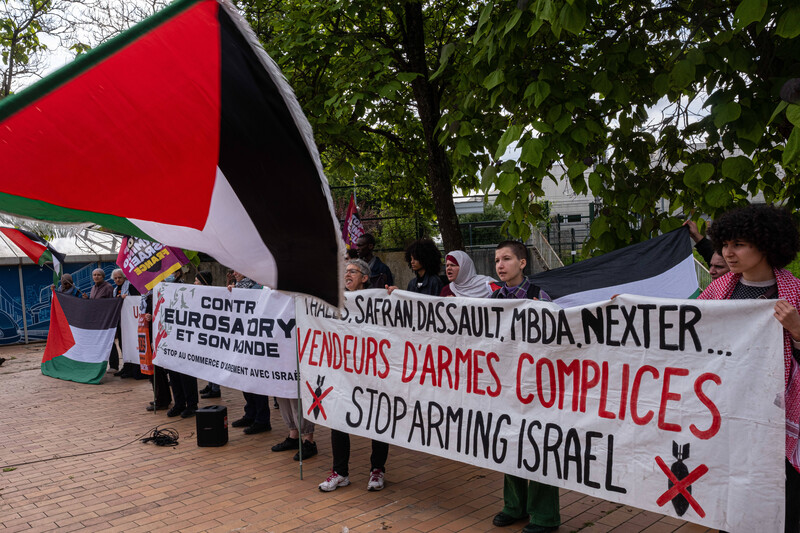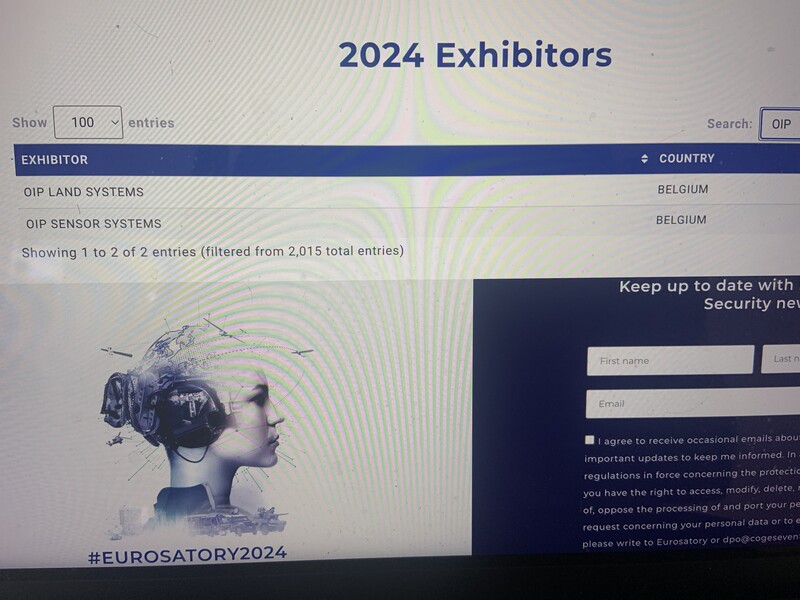Rights and Accountability 19 June 2024

A protest outside the Eurosatory weapons fair in Paris.
Le Pictorium Agency via ZUMA PressThe ban on Israel’s participation in the Paris weapons fair Eurosatory is a rare cause of cheer during these bleak times.
“Not just marginal countries such as Ireland, Luxembourg, Malta and Slovenia are suggesting that Israel is committing war crimes, but also [France] the second largest economy on the European continent,” the Tel Aviv-based business publication Globes fulminated.
It would nonetheless be unwise to quaff too much champagne – or any other drink associated with celebration.
For a start, a French court has overturned the ban – though the verdict came after the exhibition had already begun.
And while the ban has meant that the pavilion usually reserved for Israel is now hosting cafés, at least one Israeli-owned firm has apparently been able to set up a stall at Eurosatory. According to the event’s official website, OIP – the firm in question – is taking part as a Belgian company.
By doing so, the firm is being characteristically deceptive. Although based in Flanders, OIP is a subsidiary of Elbit Systems, Israel’s leading arms maker.

The Israeli-owned OIP is listed as an exhibitor at Eurosatory.
The ban evidently does not apply to weapons firms from other countries that work closely with Israel.
A new version of the Ascod armored vehicle is being showcased at Eurosatory by Santa Bárbara Sistemas, a Spanish company owned by America’s General Dynamics. Some of the vehicle’s components were supplied by the Israeli weapons giants Elbit and Rafael.
Poland’s PGZ Group, meanwhile, is displaying a Borsuk “infantry fighting vehicle” equipped with Rafael’s anti-tank missile launchers.
Vigilance is vital
The Eurosatory ban does not erase France’s previous support for Israel. As recently as last month, Stéphane Séjourné, the French foreign minister, welcomed his Israeli counterpart Israel Katz to Paris.
The same Katz announced in October that people in Gaza “will not receive a single drop of water or a single battery until they leave the world.” He was among the three Israeli political leaders whose comments were highlighted in the subsequent preliminary ruling from the International Court of Justice (ICJ).
The ICJ found that South Africa’s case against Israel under the Genocide Convention is plausible. That interim verdict is almost certainly a factor behind the Eurosatory ban and the current reluctance of some countries to provide Israel with weapons.Nearly all of the weapons imported by Israel over the past decade came from the US and Germany.
Within the past few weeks, it has been reported that Germany is no longer sending what it calls “weapons of war,” which include tanks and bombs, to Israel.
Yet the Berlin government is still posing as a steadfast friend of Israel and its weapons industry.
Olaf Scholz, the chancellor, made a point of visiting the Israeli pavilion at the ILA Berlin Air Show earlier this month.
Even if certain exports may have halted, Germany continues to be a major client of Israel’s weapons industry.
Barely two weeks before he categorized the Palestinians of Gaza as “human animals” in October, Yoav Gallant, Israel’s defense minister, signed an agreement on providing Germany with the Arrow-3 “missile defense system.” The deal is worth approximately $4.3 billion.
Such cooperation takes place amid efforts by the European Union to realize a long-standing objective of giving the weapons industry a so-called “turbo boost.”The project has been accelerated by Russia’s 2022 invasion of Ukraine. Greater militarization has been identified as a priority by Ursula von der Leyen, now seeking a second term as head of the European Commission.
Israel has strong connections to Europe’s weapons makers and has benefited from the turbo-charging to which European leaders are committed.
The Eurosatory ban may be a signal that the situation has changed. Vigilance toward Israel’s weapons makers nonetheless remains imperative.





